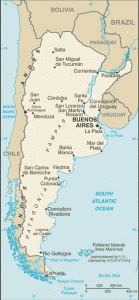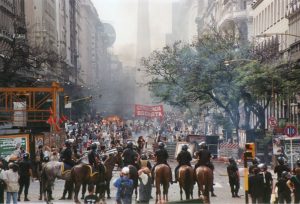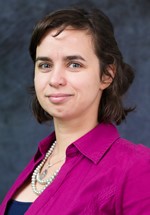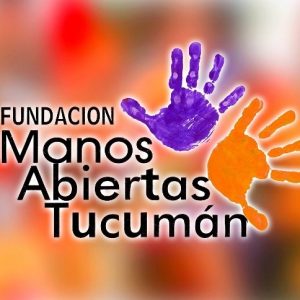Background: The Factbook
Argentina is a remnant of a larger region, Rio Plata, which declared independence from Spain in 1810. According to the CIA World Factbook, in terms of geographic size, Argentina is the 8th largest country; in terms of population, it is 33rd (45 million). Since its formation, Argentina has experienced a massive immigration of Europeans, mostly from Spain and Italy, which occupy 97% of the ethnic groups. The official language is Spanish, but other European languages (French, German, and Italian), in addition to natives languages (Quechua), maintain a strong presence in the country. Along with the idiomatic, European influence is also prevalent in the realm of music, food, and social customs. Argentines are predominantly Catholic (92%), with a few Jewish (2%) and protestant (2%) citizens. Argentina has a family oriented culture which is reflected in social gatherings in parks and on riversides. Argentina is very well known for its Gauchos (cowboys), Mate (an herb drink), Payadas (poetry), and Soccer. Culture and art is a significant part of Argentinian interest; the Tango originated in Argentina!
In terms of the government, Argentina is a representative democracy with a government system very similar to that of the United Sates. Within their constitution, there is an established system of checks and balances that includes a president, bicameral legislature (senate and deputy chamber), and judiciary supreme court. The president, currently Mauricio Macri, is the head of state and government. The legislature chamber has 257 seats, while the senate offers 72 seats and is headed by the vice-president. Politically, the government is a multi-partisan, dominated by two groups; Partido Justicialista, which was developed by former president Juan Perón in the 1940s, and Unión Cívica Radical, which was established in 1891 under former president José Corral. The country is divided into 23 provinces and the autonomous capital city of Buenos Aires. Each province functions autonomously, within the limitations of the federal constitution. The country has both universal health care as well as universal, compulsory, suffrage.
Like suffrage, primary education is also mandatory. The education system of Argentina offers equal opportunity to all citizens of all ages, completely free of charge at all levels (including university). Pre-primary education is available for children between the ages of 45 days and 5 years. At the primary and secondary levels, school children must complete at least 12 years. While primary education is an instruction on the fundamentals (reading, math, and writing) which are standard for all, secondary education is sub divided into two levels. The lower level is a continuation of general education. Referred to as the cíclo básico (basic cycle), this level offers a curriculum that explores material that is equally useful in nearly all careers paths (math, language, social science, etc.). The upper level, the cíclo orientado (oriented cycle) provides a more specialized curriculum which target the particular career paths chosen by the students (technical science, art, education, etc.) After the completion of the secondary level, students are able to automatically enroll into upper level universities, of which there are two types: public (39 schools) and private (46 schools). Since the public universities are funded by the government’s Ministry of Education, students are required to pay nothing for enrollment.
Indeed, 1.5 million students do attend universities (90% public) to further their education. For private schools however, there is a tuition fee. This can range between 7,000-17,000 dollars, and as private universities, there may exist requirements in addition to the completion of secondary education. In speaking with argentine natives on campus, I was informed that private universities are typically more career specific, (usually geared towards business school). Public schools on the other hand, offer general education (engineering, physics, art, language). Because of the tuition-free enrollment, public universities have a very high student to teacher ratio, driving them to be more prestige oriented than private schools (which cater to the wealthy). “If all you have to do is show up to enroll, you really have to be a star to be acknowledge.” Argentinian universities are founded on the westernized education model and the offered degrees are recognized at both the national and international level.
It’s crucial that I understand the workings of the Argentinian laws before travelling there to conduct service. In case of any uncertainty, I need to know what my rights are as well as anything that may be legal in the United States, but illegal in Argentina. The functionality of the Argentine education system is particularly pertinent because an aim of my service is to work with children and youth who lack educational support. Knowing the basics of the system is an absolute necessity if I am to be of any use. I’m very excited to see the European influence that exists in Argentina. It’s possible that I will work with immigrant children and will need to know bits of other languages (besides Spanish). This might suggest a need to learn about the European countries that constitute the majority of northern immigrants. Argentina is a very diverse place and it will be hard to prepare for every type of culture that I might encounter. However, having any idea of what I could potentially experience is reason enough to conduct side research and better prepare to be more effective with my service.
Policy Analysis: The Crisis Effect on Education
Regionally, Argentina is a star power in terms of human capital levels and education quality. With a literacy rate of 98% and United Nations ranking of 2nd best regional (45th global) Human Development Index, falling just behind Chile, Argentina out ranks nearly the entire continent in national potential. This is not surprising, as Argentina devotes 5.1% of its GDP to education. (4.6 in Chile, 6.4 in Bolivia, 5.0 in Paraguay, and 4.8 in the United States). Even with such astonishing statistics, Argentine public schools still manage to produce high dropout rates and lag far behind the performance of private schools in the same regions. This phenomenon reflects an increasing inequality between public and private education that immerged after the financial crisis of 1998.
During the late 20th century, as a method to combat potential inflation, the Argentinian government implemented a variety of exchange rate-based stabilization (ERBS) programs which linked the domestic peso closely to the United States dollar which experienced high appreciated in 1998. Low prices for agriculture (a main export of Argentina), the international effects of the Russian and Brazilian financial crises drove Argentina’s GDP growth rate abysmally low, causing concern about the country’s ability to pay its debts. During the presidency of Fernando de la Rúa, 1999, the International Monetary Fund agreed to a $7.2 billion assistance package. Unfortunately, global market conditions and Argentinean government instability led to the country’s complete loss of access to markets in 2001, rendering them unable to borrow or meet debt requirements Citizen accounts were frozen, to prevent massive withdrawal from banks in the face of the inevitable financial crisis. The economic depression of Argentina caused unemployment to exceed 25%, government contraction of 20%, as well as violent riots.

In the wake of the depression, the streets of Argentina has transformed into a somber and dangerous area. Littered with parents, alongside their children, begging, hungry citizens eating from restaurant dumpsters, and several without shelter at night, the Argentinian society has been destroyed by the effects of the crisis. Many have turned to cardboard collection as a way of raising money for a meal. Nearly, 100,000 storm the busy streets of Buenos Aires to collect cardboard for money. Children as young at 4 wash cars and beg in the streets to help their families raise money. Kidnapping for ransom and police corruption has also increased. The Argentinean youth (18-25 in age) has suffered the most from the crisis impacts in terms of unemployment. At a high value prior to the crisis, youth unemployment climbed substantially in 2008, much more than any other social group in all of Latin America and the Caribbean region (LAC). They have lost many previously owned employee benefits (vacation time, grade of health insurance, hour flexibility) and experienced wage cuts of 30%.
Even in the face of this disaster, Argentines have not removed their children from school. Some studies suggest that the lack of opportunity for dropouts coupled with the nationwide high-value placed on education might serve as the main driving factors for this. When I spoke to Maria Stasevicius, an Argentinean faculty member at Rice, she informed me that many children remain in school because they are guaranteed at least one meal. Additionally, children who are enrolled in school are guaranteed to receive essential vaccinations. Many, including myself, believe that factors such as these are what truly incentivize parents to keep their children enrolled. Regardless, continued enrollment has proven insufficient in combatting the combined detrimental effects of inadequate living conditions and lack of extracurricular support for impoverished children. Subsequently, much of the argentine youth has turned to alcohol and drug abuse, violence, and crime.
It’s exactly for these reasons that NGOs such as the Foundation for Sustainable Development (FSD) and its partner organizations, including Fundación MANOS, were formed. It is the belief of these organizations that community activity centers are essential for diverting youth from things like substance abuse. More than just educational support, they are in need of emotional guidance. Many of them are children and struggle to adjust to the sudden life changes brought about by the financial crisis. Within the centers there is a variety of organized, volunteer led, group activities (sports, concerts, games, crafts) for young people to enjoy as a distraction from the stress of the social situation. MANOS, the organization with which I will work this summer, has a very particular perspective on the idea. To them, arts and craft oriented activities are the most effective response to the major social problems that the youth experience. They invite volunteers with particularly art oriented talents to provide an alternative source of self-expression for Argentines. This, according to MANOS has been well received by citizens of varying ages, particularly by the younger (9-13 in age) children. In addition to recreational activities, these centers provide educational and rehabilitation courses on sexual health, nutrition, and the risks of drugs.

Breaking news
Country Specific
ONE
Domestic workers of Salta are taking action to receive social and political recognition. Ana Díaz, a house worker, created a Facebook group for those who work in private houses in Salta. The purpose of this group is to inform members of their rights and obligations as “domestic workers,” as well as provide access to legal documentation that guarantees them access to standard employee benefits. The group was created out of necessity after the Union of Domestic Employees consistently refuse to hear, let alone recognize, the numerous pleas of mistreated house workers. With 233 members, the group is growing both in recognition and in power. Members managed to procure their own holiday, April 3, which has been recognized and supported by the Ministry of Labor in the Salta province. On this holiday, they have the option to not work, or work for double pay. This year, they will meet to recognize those whom have dedicated many years to domestic service. The mission of the group is to achieve equal treatment in terms of employee benefits and social respect.
This is an event that is taking place in Salta! While it is not directly related to the social issues of youth, I do feel it is a good representation of how the city functions. It provides insight into the flexibility of the government as well as its responsiveness to its citizens. To grant a holiday specifically for house workers who felt mistreated and unrepresented is very responsive. Beyond the government’s relation to the people, this article also reveals a bit of the social construct of Salta. There are some sources of inequality there too. It says nothing about race, but there may exist a level of classism between the citizens. With respect to the workers, such as Ana, it’s reassuring to observe that although there exist issues, the people of Salta are not idle, waiting for handouts. Instead, they are actively pursuing effective changes. These are adults, many are parents, but their relentlessness could also exist in the younger citizens who aspire for a better future for themselves as well as their country.
TWO
President Macri recently announced an agreement made by several sectors of the government (Ministers of Finance, Labor, Public Policy, etc.) and business leaders, in order to attract investment into Vaca Muerta, one of the world’s largest shale reserves, located in Argentina. The government plans to subsidize $7.5 per million Btu of Natural gas produced from the sight until 2020. As a result, several oil tycoons (including BP) are making bids in the billions of dollars. Macri insisted that this agreement would reduce the cost of energy, increase jobs for Argentines, as well as increase the country’s supply of energy (See Appendix C). Blaming the shortage on the previous president (Cristina Kirchner), Macri harped that energy was necessary if the country was ever to develop and reduce poverty.
If the agreement does provide the labor revolution that Macri predicts, then this will be a great first step in breaking free from the financial crisis devastating the country. He is right that without energy, Argentina cannot expect sufficient development, and that many potential jobs exist in the energy sector. This agreement could revitalize a relatively stagnant pool of qualified employees facing low job opportunities. By providing employment opportunities, this agreement would increase wages, spending, the economy, and it would incentivize more university enrollment. This is an enormous step that could help rescue Argentina from its crisis.
Service Specific
ONE
On March 20, when discussing mechanisms for minimizing the systematic (financial, educational, & political) inequality between rich and poor families, Argentinian President Mauricio Macri made a comment about the nation’s education system that led to a massive protest by professors in the streets of the capital city Buenos Aires. In his comment, he proposed that the basic problem leading to the inequality was rooted in the educational system as some of fortunate enough, literally, to go to private school while others “have to fall into the public school system.” This was met with strong opposition from the Peronist and resulted in a massive strike by offended public educators and graduates from the public school system. The strike, which was to refute the claims of Macri included demands for salary negotiation. The approval rating of Macri diminished as a result of the event.
My service addresses the issue of students who are not receiving sufficient educational support. For the president, the head of state, to claim on nationally that the public education system of the country is a trap into which poor students “fall” is unbelievable. There is much criticism that because Macri himself was born into a wealthy family and attended only private schools and university, has no legitimacy to comment of the performance and quality of the public school system. This article does showcase the passion of public school teacher, which is a positive sign in terms of educational support for students. If teachers had not rioted in response to such an aggressive statement, one could interpret that they agree or may not genuinely be concerned about the quality of their performance as teachers.
TWO
Standardize tests in Argentina support the historical trend that the country’s northern half learns less than does the southern half in public and private school. While the majority of the country performed below satisfactory standards, an estimated 90% of students in the north finished secondary school without the minimum math requirements. The data was especially noticeable for Boys. Specifically, the data showed that “poor boys have poor result.” In retaliation, the Minister of Education in Buenos Aires proposed more school hours, higher intensity, and higher quality teachers. Regions performing at or above satisfactory attributed their success to the specific incentive programs for students and teachers as well as the department of education in that area.
This directly relates to the issue I am expected to address in Salta, a city in the north of Argentina. The data showed that 45% of Salta students tested below average which was far from the worst. However, this article gives me concrete statistic, as opposed to qualitative descriptions, of the Salta education situation. More than Salta, this article further supports the effect of the financial crisis on the country. The inequality between financial classes tends to correlate to and inequality in education as well. This is seen in the test statistics. The crisis has only increased the poverty gap between the rich and poor, which has increased the education gap. I find it interesting that the data is particularly noticeable for boys.
FACULTY
I had the honor of speaking with a Rice University Spanish professor, Maria Lujan Stasevicius about Argentina’s personality. She was born and raised in Bahía Blanca, Argentina, where she attended and graduated from Universidad Nacional del Sur. Very young, and having recently moved to the United States, Lujan was able to provide a great amount of current and relevant information about all things Argentina. She gave me with a plethora of tips that only a native would know (taxi companies, weather prep, restaurants of course). Luckily, she had travelled to Salta, and was able to prep me for the smallest kinks about the city. She informed me about the Salta accent, the siesta time where I wouldn’t be able to buy anything, and places to explore. I was really excited to hear that Salta is one of the oldest cities with the greatest Spanish influence. So much of the city’s architecture is Spanish! She was very enthusiastic about updating me on the current political and economic situation in Argentina as well as how I should respond when drawn into a political conversation. She was very transparent about with which ideology her views aligned. According to her, when anyone talks politics, they always start by attacking the other side. After that, simply reply “I agree with you” and change the subject. I shouldn’t expect to encounter any violence as a result of political disagreements, but I might be labeled. Feminism is everywhere in Argentina, because domestic violence i s an issue, and I can expect that I will witness many feminist statements.

Of course we spoke about heavier subjects like appropriate behavior. As she explained it, Argentina has danger everywhere right now. Salta is in the north, and “in the middle of nowhere,” so it is potentially even more dangerous. She ensured me that as long as I act with commonsense (listen to my host family, not traveling alone at night, etc.), I will not have a problem. She harped on the fact that Americans in general are very relaxed with displaying our possessions. That is not the case in Argentina and it’s best to be more conservative. I asked about any dangers I might encounter due to my ethnicity. I was relieved when she said “Well, you won’t get any negative racism.” That was her way of saying that I would not be attacked, but my skin color is very rare in a city such as Salta. So, I will get a lot of staring and people who will assume I do not speak Spanish. “You’ll have a nickname within a week.” She told me!
Again, these tips were incredibly useful to my travel and immersion experiences. What she told me are things I would never be able to find on any website. Only by speaking with a citizen, would I have learned the specific intricacies of the Argentinian society and how to respond to them. We are told to enter the service without any expectations, but I feel that direct discussion with a native on what I can expect, warrants credibility. I can at least be confident that what she says I will and will not encounter is a reasonable expectation to have. Of course I will not actively look for these expectations to be met. Instead, I will use what she said when it becomes applicable.
Community organization
After learning my service assignment was to Fundación MANOS, I felt it was best to speak to a representative from a local organization that does similar work. I was surprised to learn that there is a Rice founded organization that works in the Houston community with refugee high school students. The partnership for the Advancement and Immersion of Refugees (PAIR) is a nonprofit organization that aims to equip and prepare refugee student for life in the United States (specifically college life). Over 200 volunteers, a majority of which are Rice and UH students (a few community members), offer services in college prep (applications, essays, financial aid), immediate academic help (tutoring in a variety of academic subjects), as well as general life skills (how to cook, coping with stress, personal social issues) to students at 5 HISD school. PAIR provides a source of guidance to over 400 high school students, an age group typically in need of mentorship. PAIR provides a safe space for students to be with others who are experiencing, or have experienced, similar tribulations. Only formed in 2006, PAIR has yet to extend beyond the borders of Houston. This limitation in area has not, however, diminished its impact on the Houston community. PAIR collaborates with other nonprofits to host educational events for Houstonians that are interested in learning about refugees and getting involved.
I was unable to contact a representative from Fundación MANOS, however, it’s clear that their mission is similar to that of PAIR; they aim to address the social and academic challenges faced by local Salta youth, by providing mentors and a general free think space. Like PAIR, Fundación MANOS is a nonprofit. Additionally, it relies on the efforts of local artists, residents, college students. While it’s not focused on the difficulties of refugee social acclamation, like PAIR, Fundación MANOS does facilitate a form of social adaptation. Many of the children that participate are dealing with the drastic social and financial shifts resulting from the Argentinian financial crisis. Many have lost homes and must work to help their family survive. In this respect, facilitating adaptation, Fundación MANOS and PAIR are similar organizations.
The project to which I have been assigned is to help build a comprehensive, inclusive social space for integral community growth through artistic means. As I interpret it, I will contribute to the functionality of an already existing community art center by providing a form of artistic expression to its members. Effectively, I am going to be an instructor of sorts. Unlike something engineering, artistic projects such as this have no clear mark of completion. So, upon returning to the US, it may be difficult to check on the progress or sustainability of what I would have contributed during my time in Argentina. That being said, something that I learned when talking to the PAIR representative, is that many of the volunteers established close bonds with the students they mentor; often seeing each other outside of the program, messaging, and staying updated on the other’s life. Sure, I may not be able to measure the quantity of my “work,” but hopefully I will have established everlasting bonds with those that I meet, and be able to stay involved in their lives, even while I am in the United States.
Reflection
Let it be known that not once have I viewed this experience as a vacation. I am, and have always been, fully aware of the responsibility accompanying the title of Loewenstern Fellow. Since submitting my application, I have been dedicated to any and all volunteer service that I may be asked to provide before during and after my time in Argentina. Having said this, I do confess a bit of selfishness: my reason for picking Argentina was because of all of the available locations, it seemed the most suitable for me in terms of my abilities and aspirations at the time of the application. While far from fluent, I can speak Spanish relatively well. I felt it essential that I apply to a region where I could communicate effectively with locals, especially in the event that I am in danger. This contained me to the Central and South America regions.
During the application process, I was going through a shift in career aspirations. Instead of industrial engineering, I began leaning more toward international relations and communication. I no longer wanted to work for the affluent, making technology that only the wealthy would buy. Instead, I wanted to use my knowledge and language abilities to travel and help those who struggle to help themselves. Looking at the provided organizations in Latin America, I felt FSD would allow me the most variety for exploring my potential for international service. The partner organization connected to FSD address a variety of social, political, environmental, issues and concerns. This variety, to someone very recently entering the realm of international service, was very attractive. So, I chose to apply to FSD.
Through this process, I was able to learn a lot about various aspects of Argentina especially the political and educational. Moreover, I gained a significant amount of information about the financial crisis and how it has impacted the country’s functionality (protests, homelessness, political action). However, the majority of the information was oriented about the more populated, and famous, Argentinian cities such as Buenos Aires and Cordoba. Salta, while important, has very little news coverage on topics that concern the entire nation. So, it was difficult to address the social conflicts in Salta that resulted from national crises. Because of that, when discussing the issue addressed by my service project, I am assuming a degree of similarity to those in regions of Argentina that were specifically outlined in the sources I found. Beyond the lack of city specific information from news sources, I was also very limited in contact with my community organization. There are several unanswered questions about my exact position and service responsibilities. In summary, I was able to acquire a vast amount of knowledge about Argentina, but very little about Salta specifically.
One thing I was unable to fully understand is the exact cause of the financial crisis. I suspect that the source of disconnect is that I have not taken any international economics courses that could provide me with the jargon and basic knowledge of global markets needed to fully comprehend the information provided by the news sources. I understand that there were policies enacted by Kirchner, the late, former president that linked the Argentinian peso to the USD. But the flow of events involving the IMF and the country’s market inaccessibility remain fuzzy to me. This is something I would like to further explore, and it might be interesting to ask locals in Salta to see their response. I am aware that the bias for political parties are impossible to avoid, especially in Argentina, so I will have to find both sides of the story of why the economy crashed. I suspect that citizens will directly blame the president during that time, Fernando de la Rúa. This information is particularly important, because the financial crisis is the instigator of the social issues that FSD and Fundación MANOS currently combat. Understanding the most that I can will assist me in effectively combating these issues.
Appendix
References
EP-Nuffic. The Argentinian education system described and compared with the Dutch system. Netherlands, 31-01-2017. Print
Portillo, Amy. “Argentina’s Public Universities, Tuition Free.” Foreign Credits. Classbase, 14, Feb. 2010. Web. 19 March 2017
International Monetary Fund. “The Role of the IMF in Argentina, 1991-2002.” Independent Evaluation Office of the IMF. IMF. July 2003. Web. 23 March 2017
Study Argentina. “Culture in Argentina.” Study in Argentina. Study Argentina. 15 March 2017.
United Nations Development Program. Human Development Report 2016. New York, NY. 2016. Print.
The World Bank. “Government Expenditure on Education, total (% of GDP).” The World Bank. 2016. Web. 19 March 2017
Vega, Soledad. “Argentina’s Education Dilemma: the Best Educated with the Weakest System.” The Argentina Independent. 7 Dec. 2012. Web. 22 March 2017
Caballero, Ricardo. Dornbusch, Rudiger. Introduction: the Great Unraveling: Argentina 1973-1991. Financial Times. 8 March 2002. Print.
Woodruff, M. David. Boob, Gloom, Doom: Balance Sheets, Monetary Fragmentation, and the Politics of Financial Crisis in Argentina and Russia. Sage Publications. 2005. Print.
Azul, Rafael. “The Social Costs of Argentina’s Crisis.” World Socialist Web Site. International Committeee of the Fourth International. 22 Aug. 2002. Web. 21 March. 2017
Grosh, Margaret. Bussolo, Maurizio. Freije, Samuel. Understanding the Poverty Impact of the Global Financial Crisis in Latin America and the Caribbean. The World Bank. Washington D.C. 2014. Print.
Breaking News Articles
https://www.clarin.com/sociedad/brecha-educativa-estudiantes-norte-pais-aprenden_0_Hynuh9anx.html
http://www.eltribuno.info/salta/nota/2017-4-3-0-0-0-trabajadores-de-casas-particulares-de-festejo-y-sin-sindicato
https://www.usnews.com/news/world/articles/2017-03-22/macri-public-school-gaffe-helps-fuel-argentine-teachers-protest
http://www.infobae.com/politica/2017/01/10/mauricio-macri-el-desarrollo-de-vaca-muerta-va-a-generar-una-verdadera-revolucion-de-empleo/
http://www.reuters.com/article/us-argentina-gas-idUSKBN14V03N




